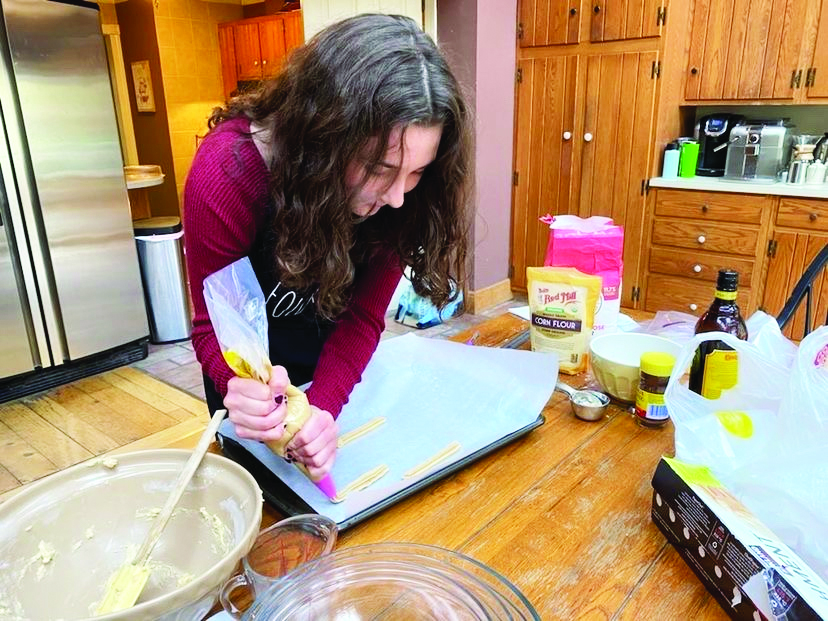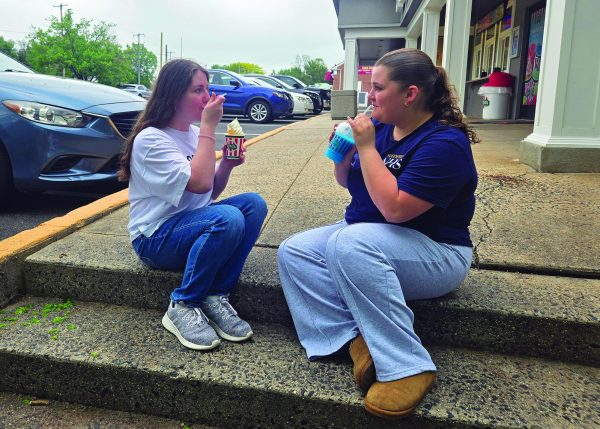No sugarcoating: ‘The Great British Bake Off’ reigns supreme
By whipping up the perfect recipe for a baking show, ‘The Great British Bake Off’ delights viewers with a fresh take on amateur baking. Many U.S. baking shows focus more on competition and dramatizations, taking away from the true essence of baking.
Arrowhead photo by Madison Stine
That’s a nice bake…Piping the dough for a “The Great British Bake Off” inspired dessert, amateur baker Claudia Elwell follows the recipe of the technical challenge. The dessert, Prue Leith’s tiramisu sandwich bites, was featured on the third episode of the show’s Stand Up for Cancer Series.
Greatly contrasting from U.S. baking shows, ‘The Great British Bake Off’ offers new elements to baking competitions, such as a family dynamic and celebrating the art of baking without sacrificing entertainment.
One of the most glaring differences between ‘The Great British Bake Off’ and baking U.S. baking shows is the professional baking experience of the competitors.
Contestants on GBBO are all at different levels of baking experience. However, no contestant is considered a professional baker.
Baking is a hobby for them that has brought them joy and passion.
Viewers get to see the contestants as actual people with families, emotions, opinions and a simple love for baking through short segments showing the baker’s home and work life.
Conversely, contestants on American baking shows are often owners of a bakery or much more experienced professional bakers.
The entertainment of U.S. baking shows is centered around intensity and drama, taking away what the true nature of baking shows should be: to display the creativity and technicality of the contestants.
For example, in U.S. baking shows, contestants are given baking assignments during production and the host will often introduce challenges during the competition, such as a strange ingredient that the contestants must incorporate into their bakes.
These aspects of U.S. baking shows make the real test of their skills being how well they can think on their feet and perform under pressure, rather than how well they’re able to bake.
Viewers see the stress the bakers are under, which is amplified by intense background music and dramatizations. If they lose, their self-made business could be negatively impacted.
‘The Great British Bake Off’ functions much differently, allowing the contestants to showcase their talent for baking without sacrificing entertainment and competition.
For instance, contestants are given their baking assignments for the Signature and the Showstopper one week before production for that episode takes place.
This gives the bakers time to research, construct, practice and revise their recipes. With prior time to properly practice what they will bake on filming day, bakers are able to showcase their creativity and overall baking skills.
Bakers are still tested on their ability to adapt and think on their feet, particularly during the technical challenge. During this portion of the show, all competitors are given the same recipe and the judges blindly rank the desserts.
The portrayal of “failure” within ‘The Great British Bake Off’ is also very different. Many U.S. baking shows are designed to please the viewer by keeping them intrigued in awaiting a contestant’s failure. They aren’t people, just characters that are renewed for each new episode.
Each season of ‘The Great British Bake Off’ follows the same bakers, not new bakers each episode as most U.S. baking shows do.
This allows contestants to build a loving family dynamic throughout the season, as they simultaneously support and help each other while competing against each other.
As a result, the viewers only want the best for these bakers that they’ve grown to love throughout the season. The bakers aren’t displayed as characters or pons for entertainment, but as real and relatable people.
According to season 10 competitor Henry Bird, it is evident that everyone on the show has a love for baking.
“You’re doing something you love, surrounded by people who love it as much as you, with a brilliant production team in the most beautiful countryside,” Bird said. “Along the way, you meet some people who will end up being friends for life and if there was ever a chance to have another day in the tent, we’d all absolutely jump at it.”
When the bakers make mistakes or are sent home, not only do the viewers feel saddened, but the other contestants openly show sympathy for that baker.
For example, when a baker is sent home, the other bakers gather around them, hugging, even crying at times. Sometimes, bakers will whisper encouraging and sympathetic messages to the baker that was sent home.
This allows the audience to see the close relationships and honest connections that the bakers have developed with each other.
Contestants obviously establish a connection and bond with one another, even though a pairing may seem unlikely.
One prominent relationship throughout the series is between season six competitors Val Stones and Selasi Gbormittah, a pairing with many differences, specifically generationally.
“The reason I like Selasi is: being around young people—listening to them, knowing what makes them tick—gives you an insight into the beat of life now,” Stones said in a 2019 ‘The Atlantic’ interview with Gbormttah, “It stops me getting older far before I need to.”
The concept of winning is also very different within ‘The Great British Bake Off’.
According to season 11 finalist Laura Adlington, the contestants are aware of the amount of Americans watching the show and how it differs from other baking competitions.
“We know how much Americans love the show and we love that,” Adlington said in a 2020 interview with Vulture, “From our point of view, a lot of television shows have a big cash prize in the end and it’s very dog-eat-dog with people out to win. With us, there’s no cash prize in the end. It’s a glass bowl.”
Despite not receiving a cash prize, many winners greatly benefited from the popularity of the show and their titles.
For example, season six winner Nadiya Hussain has starred in various baking shows, written multiple books, increased representation for women of color and even baked the cake for Queen Elizabeth II’s 90 birthday celebration.
“Growing up, I didn’t see a Muslim woman on television… it’s important to create that space in publishing, in television, in cookery,” Hussain said in a 2019 interview with ‘You’ magazine.
There is a sense of charm within GBBO that can not be replicated.








